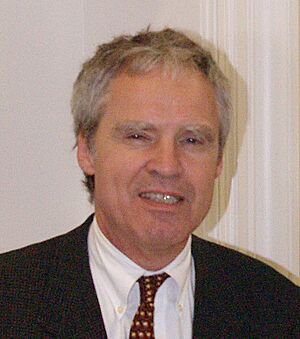Horst Ludwig Störmer facts for kids
Quick facts for kids
Horst Ludwig Störmer
|
|
|---|---|

Störmer in 1998
|
|
| Born | April 6, 1949 |
| Nationality | German |
| Alma mater | University of Stuttgart Goethe University Frankfurt |
| Known for | Fractional quantum Hall effect |
| Awards | Oliver E. Buckley Condensed Matter Prize (1984) Nobel Prize in Physics (1998) The Benjamin Franklin Medal (1998) |
| Scientific career | |
| Fields | Physics |
| Institutions | Columbia University Bell Labs |
| Doctoral advisor | Hans-Joachim Queisser |
| Doctoral students | Jun Zhu |
Horst Ludwig Störmer (born April 6, 1949) is a German physicist. He is a Nobel laureate and a retired professor at Columbia University.
He won the 1998 Nobel Prize in Physics. He shared it with Daniel Tsui and Robert Laughlin. They received the award for discovering a new type of "quantum fluid." This fluid has tiny parts that act like they have only a fraction of an electric charge. This discovery is called the fractional quantum Hall effect. Störmer and Tsui made this discovery while working at Bell Labs.
Contents
About Horst Störmer
Horst Störmer was born in Frankfurt am Main, Germany. He grew up in a nearby town called Sprendlingen. After finishing high school in 1967, he first studied architectural engineering. This was at the TH Darmstadt.
His Path to Physics
Later, he moved to the Goethe University Frankfurt to study physics. He earned his diploma there. He worked in a lab with Werner Martienssen. Another future Nobel Prize winner, Gerd Binnig, also worked there.
Störmer then went to France for his PhD research. He worked in Grenoble at a special lab. This lab had very strong magnetic fields. He earned his PhD from the University of Stuttgart in 1977. His research was about how electrons behave in strong magnetic fields. While in Grenoble, he met Dominique Parchet.
Working in the United States
After getting his PhD, Störmer moved to the United States. He started working at Bell Labs. This is where he did the important research that led to his Nobel Prize. He worked at Bell Labs for 20 years.
Later, he became a professor at Columbia University in New York City. He taught physics and applied physics. In 2006, he was chosen to be part of the American Philosophical Society. He retired from teaching in 2011. Störmer is now a citizen of the United States.
Amazing Discoveries
One of Störmer's key inventions is called modulation doping. This is a way to make very special materials. These materials allow electrons to move extremely easily. This invention was very important. It helped scientists later observe the fractional quantum Hall effect.
The Fractional Quantum Hall Effect
Störmer and Daniel Tsui discovered the fractional quantum Hall effect in October 1981. They did this experiment at the Massachusetts Institute of Technology. Within a year, Robert Laughlin was able to explain why this strange effect happened.
For their groundbreaking work, Störmer, Tsui, and Laughlin were awarded the 1998 Nobel Prize in Physics. Their discovery showed a new and unexpected way that electrons can behave in certain materials.
See also
 In Spanish: Horst L. Störmer para niños
In Spanish: Horst L. Störmer para niños
 | Jessica Watkins |
 | Robert Henry Lawrence Jr. |
 | Mae Jemison |
 | Sian Proctor |
 | Guion Bluford |

